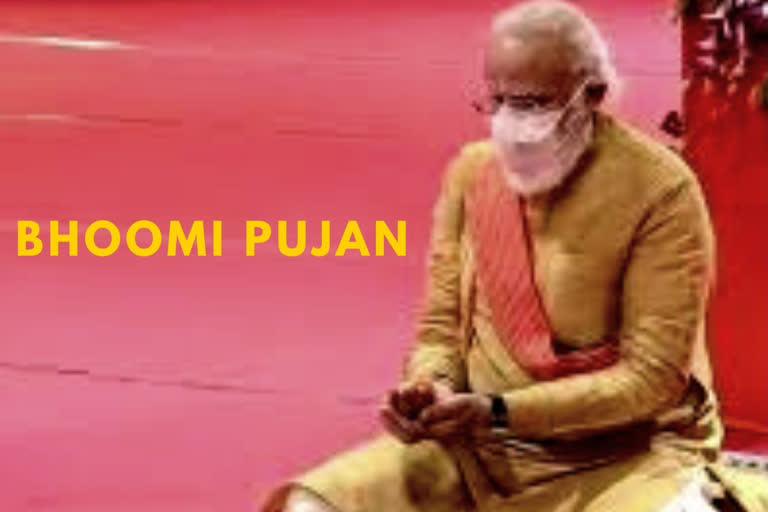Ayodhya (Uttar Pradesh): Prime Minister Narendra Modi on Wednesday performed the 'Bhoomi Pujan' of a Supreme Court-mandated Ram temple in Ayodhya, bringing to fruition the BJP's mandir' movement that defined its politics for three decades and took it to the heights of power.
RSS chief Mohan Bhagwat and Uttar Pradesh Chief Minister Yogi Adityanath were among those who attended the event at the site where a large number of devout Hindus believe Lord Ram was born.
Also read: LIVE: Bhoomi Pujan concludes, PM Modi lays Ram Temple foundation stone
The guest list, including religious leaders who formed part of the movement that started in the 1980s, was restricted to 175 in view of the COVID-19 crisis.
As a priest chanted Sanskrit shlokas' and the ground-breaking ceremony got underway under a giant marquee decorated in shades of reds and yellows, Modi and the other dignitaries, all in masks, maintained social distancing and sat a safe distance away from each other.
Slogans of 'Bharat Mataki Jai' and 'Har Har Mahadev' went up as the ritual ended and the prime minister laid the foundation of the temple.
'Bhajans and shlokas' were heard as the town, festooned with marigold flowers and yellow and saffron flags, celebrated the beginning of the construction of a grand Ram temple. Roads leading to Ayodhya were adorned with hoardings of the proposed temple and of Ram Lalla, the infant Ram, the deity now housed in a makeshift temple. Most shops were painted in bright yellow.
The prime minister arrived in Ayodhya in a helicopter where Adityanath among others received him.
Before the function to lay the foundation stone of the 'Shree Ram Janmabhoomi Mandir', the prime minister took part in prayers at the Hanumangarhi temple.
From there, he travelled to the 'Shree Ram Janmabhoomi' where he performed prayers at the 'Bhagwan Shree Ramlala Virajman'.
He also planted a Parijat (Indian night jasmine) sapling.
He will unveil a plaque to mark the laying of the foundation stone and also release a commemorative postage stamp on the 'Shree Ram Janmabhoomi Mandir'.
On November 9, 2019, the Supreme Court settled the fractious issue going back more than a century and backed the construction of a Ram temple by a trust at the disputed site. It also ruled that an alternative five-acre plot must be found for a mosque in the Hindu holy town.
Also read: 3 held for rape and attack on 75-year-old lady in Kerala
Delivering a unanimous judgement on a case that had long polarised the country, the court said the faith of the Hindus that Lord Ram was born at the site was undisputed.
The Ram Janmabhoomi movement got a fillip in 1990 with then BJP president L K Advani's rath yatra'. Two years later, in December 1992, the 16th-century Mughal-era Babri Masjid, built on what large sections believe is Lord Ram's birthplace, was demolished.



